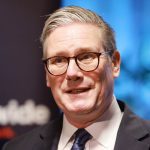Scores of drivers have been penalised for violating a significant safety regulation across the UK, which carries a hefty £1,000 fine to discourage such behaviour. Penalties have been issued to motorists for contravening the 1937 Road Traffic Act, which mandates Britons to have good eyesight while navigating UK roads.
A Freedom of Information request revealed that between 2021 and October 2024, 50 licence endorsements were given for “driving with uncorrected eyesight”. An additional two drivers were also slapped with endorsements for refusing to take an eyesight test during this period.
The police-conducted eyesight test requires drivers to be able to clearly read a vehicle number plate from a distance of 20 metres. In one clampdown before Christmas Lincolnshire officers went out on the roads carrying out the tests.
Insp Jason Baxter, of Lincolnshire Police, said: “Good vision is a prerequisite of safe driving, so it’s vital that before you get behind the wheel you are sure that your eyesight is up to the task.”
Drivers unable to read a number plate from a distance of 20m (about 65ft) during daylight risk having their licences taken away under Cassie’s Law legislation.
Insp Baxter said: “If you fail the required standards, you are breaking the law and this could mean a fine of up to £1,000, three penalty points and even possible disqualification.” Insp Neil Hutchins, of Humberside Police, said: “Vision can decline gradually without you realising, so we are urging everyone to make sure they have regular eye tests as well as checking that friends and older relatives are getting tested regularly, too.
“As the nights draw in, vulnerable road users (such as horse riders, cyclists and motorcyclists) can be harder to spot, making good eyesight even more essential for all road users.”
Cassie’s Law, introduced in 2013, was inspired by the death of 16-year-old Cassie McCord. She died in 2011 when 87-year-old Colin Horsfall lost control of his car in Colchester, having failed a police eyesight check days earlier.
Since the introduction of the law, officers can request an urgent revocation of a driver’s licence through the DVLA if they believe other road users could be at risk.
The initiative, which runs over the next two weeks, is part of the National Police Chiefs’ Council’s Operation Dark Night campaign.
Graham Conway from Select Car Leasing commented: “We’ve uncovered a relatively small number of licence endorsements but they still illustrate how police are actively pursuing motorists who are driving with poor vision.”
While the majority of prosecutions are for motorists in their 70s, there’s a concerning spread of licence endorsements across all age ranges – from those in their early 20s to one motorist aged 91 at the time of the offence.
“What this tells us is that all drivers, no matter how young or old they might be, need to take their eyesight seriously. After all, driving with impaired vision poses an obvious risk for all road users.”
In November of the previous year, the National Police Chiefs’ Council initiated an operation to tackle drivers with poor eyesight by conducting roadside vision tests. The Freedom of Information (FOI) request specifically examined motorists who received an “MS70” endorsement for driving with uncorrected sight, which also carries a penalty of three points.
Depending on the offence, endorsements remain on a driver’s licence for four, eight or 11 years. Drivers who receive the MS70 endorsement may face additional difficulties when seeking car insurance.
An MS70 endorsement could result in rejection from insurance companies, necessitating the use of a specialist broker and potentially increasing costs. The FOI revealed that 14 offences were recorded in 2023, with four noted in 2024.
Under UK law, drivers are required to wear glasses or contact lenses every time they drive to meet the minimum standards. Drivers must also inform the DVLA of any health conditions that affect their vision, excluding short or long-sightedness, or colour blindness.
The RAC states: “If a driver fails to successfully read a licence plate from 20-metres away, and is deemed to be unsafe to drive their licence can be revoked immediately. Currently, the motorist will not receive points on their licence but will instead have to reapply for a new one. Once a licence is revoked, the DVLA imposes a disqualification period during which the driver cannot reapply. A new licence.”
Police forces across the region are conducting roadside eye tests as part of a nationwide road safety initiative.












